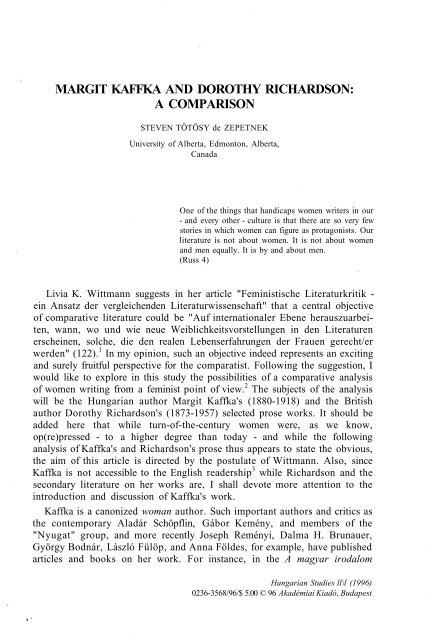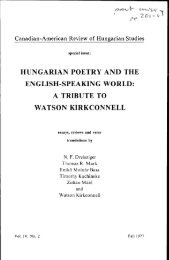76 SAMUEL J. WILSON8. Artúr Görgey, Életem és működésem <strong>Magyar</strong>országon 1848-ban és 1849-ben [My life and actsin Hungary, 1848-1849], vol. 1 (Budapest, 1988), 138.9. Ibid., 285-29<strong>1.</strong>10. Ibid., vol. II, 230-23<strong>1.</strong>W.Ibid., vol. 1,429.12. Ibid, vol. II, 110.13. J. F. C. Fuller, Grant and Lee, A Study in Personality and Generalship (Bloomington, Indiana,1982), 42.14. Görgey, Életem és működésem, vol. I, 286.15. Ian W. Roberts, Nicholas I and the Russian Intervention in Hungary (New York, 1991), 73.16. Görgey, Életem és működésem, vol. 1, 298. Görgey abandoned a garrison at Lipótvár(Leopoldstadt) to the Austrians in order to preserve his army.17. Deák, The Lawful Revolution, 235.18. Görgey, Életem és működésem, vol. I, 446.19. Ibid., vol. II, 207-225.20. Roberts, Nicholas I, 70-7<strong>1.</strong>2<strong>1.</strong> Görgey, Életem és működésem, vol. II, 13-14.22. Ibid., vol II, 50.23. Ibid., 66.24. Ibid., 63-64.25. Ibid.26. Roberts, Nicholas I, 138.27. Görgey, Életem és működésem, vol. II, 190.28. Roberts, Nicholas I, 109.29. Görgey, Életem és működésem, vol. II, 53.30. Deák, The Lawful Revolution, 308.3<strong>1.</strong> Görgey, Életem és működésem, vol. II, 242.32. Ibid., 246-247.33. Roberts, Nicholas I, 157-160.34. Deák, The Lawful Revolution, 307.35. Ibid, 307-308.36. Roberts, Nicholas I, 73.37. Ibid., 174.38. Görgey, Életem és működésem, vol. II, 363-364.39. Ibid., 388.40. Roberts, Nicholas I, 185.4<strong>1.</strong> Ibid., 206.42. Ibid., 73.43. Ciausewitz's quotes for this work were cited from Carl von Clusewitz, On War (New York:Penguin Classics, 1982).44. György Klapka, Memoirs of the War of Independence in Hungary, trans, by Otto Wenckstern(London, 1850), vol. I, 183-184.
MARGIT KAFFKA AND DOROTHY RICHARDSON:A COMPARISONSTEVEN TÖTÖSY de ZEPETNEKUniversity of Alberta, Edmonton, Alberta,CanadaOne of the things that handicaps women writers in our- and every other - culture is that there are so very fewstories in which women can figure as protagonists. Ourliterature is not about women. It is not about womenand men equally. It is by and about men.(Russ 4)Livia K. Wittmann suggests in her article "Feministische Literaturkritik -ein Ansatz der vergleichenden Literaturwissenschaft" that a central objectiveof comparative literature could be "Auf internationaler Ebene herauszuarbeiten,wann, wo und wie neue Weiblichkeitsvorstellungen in den Literaturenerscheinen, solche, die den realen Lebenserfahrungen der Frauen gerecht/erwerden" (122). 1 In my opinion, such an objective indeed represents an excitingand surely fruitful perspective for the comparatist. Following the suggestion, Iwould like to explore in this study the possibilities of a comparative analysisof women writing from a feminist point of view. 2 The subjects of the analysiswill be the Hungarian author Margit Kaffka's (1880-1918) and the Britishauthor Dorothy Richardson's (1873-1957) selected prose works. It should beadded here that while turn-of-the-century women were, as we know,op(re)pressed - to a higher degree than today - and while the followinganalysis of Kaffka's and Richardson's prose thus appears to state the obvious,the aim of this article is directed by the postulate of Wittmann. Also, sinceKaffka is not accessible to the English readership 3 while Richardson and thesecondary literature on her works are, I shall devote more attention to theintroduction and discussion of Kaffka's work.Kaffka is a canonized woman author. Such important authors and critics asthe contemporary Aladár Schöpflin, Gábor Kemény, and members of the"Nyugat" group, and more recently Joseph Reményi, Dalma H. Brunauer,György Bodnár, László Fülöp, and Anna Földes, for example, have publishedarticles and books on her work. For instance, in the A magyar irodalomHungarian Studies ll\l (1996)0236-3568/96/$ 5.00 © 96 Akadémiai Kiadó, Budapest
- Page 1 and 2:
Papers of the Radnóti Memorial Con
- Page 3:
HUNGARIAN STUDIESVOLUME 11, 1996 CO
- Page 8 and 9:
6 GEORGE GÖMÖRIprobably Fürst an
- Page 10 and 11:
8 GEORGE GÖMÖRIof the utmost impo
- Page 12 and 13:
10 GEORGE GÖMÖRIén e földön...
- Page 14 and 15:
12 GEORGE GÖMÖRINotes1. Miklós R
- Page 16 and 17:
14 MIHÁLY SZEGEDY-MASZÁKself alwa
- Page 18 and 19:
16 MIHÁLY SZEGEDY-MASZÁKtype is r
- Page 20 and 21:
18 MIHÁLY SZEGEDY-MASZÁKpose, the
- Page 22 and 23:
20 MIHÁLY SZEGEDY-MASZÁK"Wozu Dic
- Page 24 and 25:
22 MIHÁLY SZEGEDY-MASZÁKand Wilme
- Page 26 and 27:
24 MIHÁLY SZEGEDY-MASZÁKbeen the
- Page 28 and 29: 26 MIHÁLY SZEGEDY-MASZÁKBolond, k
- Page 30 and 31: 28 MIHÁLY SZEGEDY-MASZÁK6. Emery
- Page 32 and 33: 30 ZSUZSANNA OZSVÁTHand breaks as
- Page 34 and 35: 32 ZSUZSANNA OZSVÁTHThe drama echo
- Page 36: 34 ZSUZSANNA OZSVÁTHcontinents at
- Page 39 and 40: FROM CAIN TO NAHUM 37which, as Csap
- Page 41 and 42: \FROM CAIN TO NAHUM 39and bears and
- Page 43 and 44: FROM CAIN TO NAHUM 41who sees what
- Page 45 and 46: FROM CAIN TO NAHUM 438. "A félelme
- Page 47 and 48: HELP ME, PASTORAL MUSE:THE VIRGELIA
- Page 49 and 50: HELP ME, PASTORAL MUSE 47compete! W
- Page 51 and 52: HELP ME, PASTORAL MUSE 49of a priva
- Page 53 and 54: HELP ME, PASTORAL MUSE 51Once again
- Page 55 and 56: HELP ME, PASTORAL MUSE 53Eighth Ecl
- Page 57 and 58: HELP ME, PASTORAL MUSE 55have that
- Page 59: HELP ME, PASTORAL MUSE 57Paul de Ma
- Page 62 and 63: 60 SAMUEL J. WILSONWe did, however,
- Page 64 and 65: 62 SAMUEL J. WILSONbeings and contr
- Page 66 and 67: 64 SAMUEL J. WILSONHungarians would
- Page 68 and 69: 66 SAMUEL J. WILSONthe Austrians. G
- Page 70 and 71: 68 SAMUEL J. WILSONnorth-eastern Zi
- Page 72 and 73: 70 SAMUEL J. WILSONoriginally pursu
- Page 74 and 75: 72 SAMUEL J. WILSONGörgey's decisi
- Page 76 and 77: 74 SAMUEL J. WILSONfrom occurring,
- Page 80 and 81: 78 STEVEN TÖTÖSY de ZEPETNEKtört
- Page 82 and 83: 80 STEVEN TÖTÖSY de ZEPETNEKThe c
- Page 84 and 85: 82 STEVEN TÖTÖSY de ZEPETNEKher u
- Page 86 and 87: 84 STEVEN TÖTÖSY de ZEPETNEKthe b
- Page 88 and 89: 86 STEVEN TÖTÖSY de ZEPETNEKrooti
- Page 90 and 91: 88 STEVEN TÖTÖSY de ZEPETNEKcriti
- Page 92 and 93: 90 STEVEN TÖTÖSY de ZEPETNEK'My f
- Page 94 and 95: 92 STEVEN TÖTÖSY de ZEPETNEKshe d
- Page 96 and 97: 94 STEVEN TÖTÖSY de ZEPETNEKNotes
- Page 99 and 100: BERLIN ET PARIS DE LAJOS TIHANYIVAL
- Page 101 and 102: BERLIN ET PARIS DE LAJOS TIHANYI 99
- Page 103 and 104: BERLIN ET PARIS DE LAJOS TIHANYI 10
- Page 105 and 106: BERLIN ET PARIS DE LAJOS TIHANYI 10
- Page 107 and 108: BERLIN ET PARIS DE LAJOS TIHANYI 10
- Page 109 and 110: BERLIN ET PARIS DE LAJOS TIHANYI 10
- Page 111 and 112: BERLIN ET PARIS DE LAJOS TIHANYI 10
- Page 113 and 114: BERLIN ET PARIS DE LAJOS TIHANYI 11
- Page 115: BERLIN ET PARIS DE LAJOS TIHANYI 11
- Page 118 and 119: 116 KEVIN E. KELLYfilms Lugosi made
- Page 120 and 121: 118 KEVIN E. KELLYthe provinces, no
- Page 122 and 123: 120 KEVIN E. KELLYWith his brief an
- Page 124 and 125: 122 KEVIN E. KELLYboth his and Dean
- Page 126 and 127: 124 KEVIN E. KELLYfollowed it into
- Page 128 and 129:
126 KEVIN E. KELLYvampiric nobleman
- Page 130 and 131:
128 KEVIN E. KELLYThe film also boo
- Page 132 and 133:
130 KEVIN E. KELLYWood remained one
- Page 134 and 135:
132 KEVIN E. KELLYLugosi, convinced
- Page 136 and 137:
134 KEVIN E. KELLY19. Lennig, 112-1
- Page 139 and 140:
THE AGON OF IRONY AND SATIREIN GYÖ
- Page 141 and 142:
THE AGON OF IRONY AND SATIRE 139poe
- Page 143 and 144:
THE AGON OF IRONY AND SATIRE 141tra
- Page 145 and 146:
THE AGON OF IRONY AND SATIRE 143fek
- Page 147 and 148:
THE AGON OF IRONY AND SATIRE 145ner
- Page 149 and 150:
THE AGON OF IRONY AND SATIRE 147whi
- Page 151 and 152:
THE AGON OF IRONY AND SATIRE 149mov
- Page 153 and 154:
THE AGON OF IRONY AND SATIRE 151for
- Page 155 and 156:
THE AGON OF IRONY AND SATIREA harma
- Page 157 and 158:
MURDER IN THE MOUNTAINSTranslated b
- Page 159 and 160:
MURDER IN THE MOUNTAINS 157"Afraid?
- Page 161 and 162:
MURDER IN THE MOUNTAINS 159Abády,
- Page 163 and 164:
MURDER IN THE MOUNTAINS 161"The mar
- Page 165 and 166:
MURDER IN THE MOUNTAINS 163Bálint
- Page 167 and 168:
MURDER IN THE MOUNTAINS 165"That is
- Page 169 and 170:
MURDER IN THE MOUNTAINS 167at hand,
- Page 171 and 172:
CONTRIBUTORSMiklós BÁNFFYLászló
















